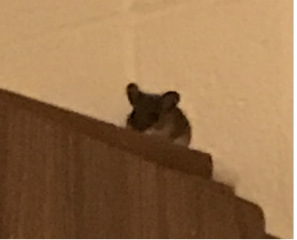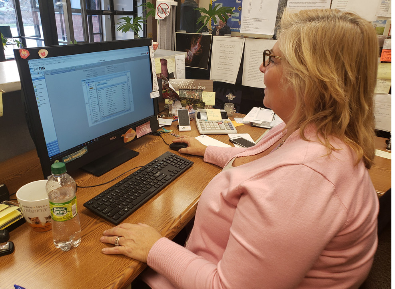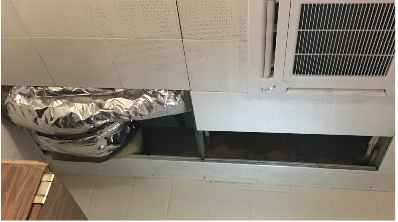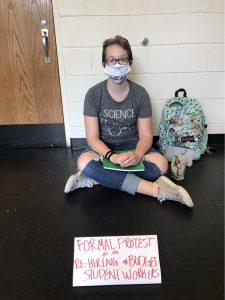Last updated on Nov 21, 2019
By Ashley Bowden
Co-Editor-In-Chief
There are a variety of problems students face while living in a residence hall, and some of those problems are smaller than others. For Jules Rivera, senior acting major, and Pearl Emerson, junior musical theatre major, the presence of two small mice in their dorm room resulted in a much larger issue.
Rivera and Emerson live in Riggs Hall, and during the week of Oct. 20-26, the two noticed a leak in their room’s ceiling. They assumed it was caused by the air conditioning unit and thought nothing of it; on Oct. 31, they noticed another leak in a different spot. “We called facilities. They took out all the ceiling tiles in that specific corner. We were worried we were going to have to move,” Rivera said.
The worker assured them that they wouldn’t have to move as long as they were fine with the tiles missing for a couple of days while they inspected the leak’s cause. After five days, two workers returned to the room to inspect the ceiling but didn’t replace the tiles.
“They left a leak in the room. The water was all over the floor. Pearl and I had to use our own personal towels to clean it up. They [facilities] brought in a trash can to catch the water and said that they would send somebody to come and clean it up. They didn’t send anybody,” Rivera said.
When Rivera returned to her room around 1:15 a.m. on Thursday, Nov. 7, it was filled with commotion and several visiters, including Eliza Lopes, a friend of Emerson’s who attends Ithaca College. The uproar in the room was over a small mouse that fell from the hole in the ceiling. “The mouse appeared from under the fridge,” Lopes said.
“Everyone was freaking out. They said that a mouse came down from the hole, fell on top of the closet, fell from the top of the closet all the way down, and it was scurrying somewhere in the room,” Rivera said. “At 2 a.m., another mouse came down and was on top of the closet. There [were] two.” By that time, the other visitors had left the room.
Immediately after seeing the second mouse, Rivera called public safety. “One found its way onto my desk and ran all the way across my desk, back and forth on top of the TV. All of a sudden [the mouse] disappeared behind my dirty laundry underneath my bed,” Rivera said.
When the public safety officer arrived, he used a flashlight to search the room and asked the two roommates if the mice typically come out in light. Rivera and Emerson couldn’t answer the question, but assured him that the mice were present in the room.
Afterwards, the roommates contacted the RA on duty, Kaitlyn Fiskin, and she helped relocate the three roommates to an emergency room down the hall. Rivera slept in the room for three nights while Emerson and Lopes spent two nights in the room.
Facilities neglected to reach out to the roommates the following day, so Rivera called Campus Life and asked what they would do to fix it. Staff members contacted facilities to replace the ceiling tiles, though the mice were still roaming their room with no way out. “My mom called and complained and I got through to Jeanie [Jean Anne Smith] because of it. She’s awesome, she was so helpful,” Rivera said.
“If something falls through the cracks and it’s brought to my attention, I call, and I ask for them [facilities] to please take a look into it immediately, which is what I did for them,” Jean Anne Smith, associate dean of students,” said.
Beth Funfgeld, service response manager at facilities services, also spoke with Rivera’s mother. “I gave her the steps that we took to rectify the problem. I love to talk to the parents to let them know [their kids] are safe and sound, and I will take care of them,” Funfgeld said.
Due to a phone call from Funfgeld, Professional Exterminating assisted in setting baiting stations for the mice in various areas throughout the room. The baiting stations were laid with rodenticides that would dehydrate the mice upon consumption, which would cause the mice to leave the room in search of water. The exterminator returned to the room twice to confirm the mice were eating the bait, and they were, according to Funfgeld.
A few days later, the roommates returned to their room to find the stations were not being monitored or cleaned. “There [were] pellets all over my desk and I had to wipe them off myself with Lysol wipes. Pearl had to clean up the room completely,” Rivera said.
Funfgeld was uncertain if the exterminating company’s policy is to keep the stations set as a precautionary measure, or if they typically remove them after a certain amount of time. Emerson is confident that if they sent in a work order to facilities, the baiting stations would be removed immediately.
On Nov. 11, Rivera and Emerson sent emails to Matthew Blanar, director of events and operations, Ashley John, director of student engagement and Jesse Meany, resident director and coordinator, detailing her dis-comfort with her situation, her concern for her personal items and unprofessional manner in which she perceived the issue was being handled. “It’s a risk to our personal health; it came down from the ceiling; we don’t know what kind of bacteria it’s carrying, what kind of diseases or anything like that, what it peed on,” Rivera said. She believes this situation could have been avoided if facilities service workers responded in a more timely manner.
“When I emailed Ashley John, she immediately got somebody to clean up all the feces, which was great and there’s no more of that,” Emerson said. In addition to cleaning all the feces, the facilities worker did a thorough job of cleaning the room, from wiping down the wardrobe to mopping the floor.
“What happens is there’s sometimes some miscommunications between trades,” Smith said. “We understand that there is not one specific system in place where we can close that loop [between departments].” Smith is working closely with facilities services in regards to the reporting of work orders and building inspections, and ensuring continuous communication between students and the appropriate departments.
Emerson agrees the issue lies within the lack of communication among various departments and with students. “When the work was actu-ally done, it was fixed, but it took forever,” they said. “I was never left a note when facilities or maintenance or whoever showed up. I didn’t know what they did, if they came in or not, what they needed, if they were going to come back, anything.”
Resources are now made more available for students. “The TMA online work order sys-tem is found on the [university] website, and since the kids are so tech savvy, you can put a ticket in as you’re walking to the dorm if you see a light out or paint peeling somewhere,” Funfgeld said. “Once your work order is com-plete, you get a notification that says this job was complete, and it gives you the date and the time.”
As of Monday, Nov. 18, the ceiling in Ri-vera and Emerson’s room was repaired and no longer leaks when it rains. Two baiting stations remain in the room, but neither student has seen any dead mice. A metal under-door excluder was installed to keep more mice from entering the room.













Be First to Comment